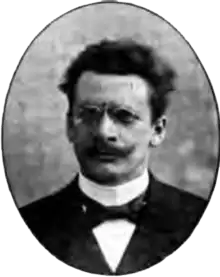Ernst Jentsch
Ernst Anton Jentsch (1867-1919) was a German psychiatrist. He authored works on psychology and pathology and is best known for his essay On the Psychology of the Uncanny (1906).[1] However, he also authored texts on mood and the psychology of music. He is remembered for his influence on psychoanalyst Sigmund Freud who mentions the work of Jentsch in his essay The Uncanny. Jentsch's work was also a great influence on the theory of the uncanny valley.[2]

Ernst Jetsch, 1908
He died in 1919.[3]
Works
- Musik und Nerven (2 volumes), 1904-1911
- Zur Psychologie des Unheimlichen, 1906
- Die Laune, 1912
- Das pathologische bei Otto Ludwig, 1913
Translations
- Studies of psychology of sex, by Havelock Ellis
- translated as Die krankhaften Geschlechtsempfindungen auf dissoziativer Grundlage, 1907
- Studien über Genie und Entartung, 1910, Original by Cesare Lombroso[4]
References
- http://art3idea.psu.edu/locus/Jentsch_uncanny.pdf
- MacDorman, K. F. & Chattopadhyay, D. (2016). Reducing consistency in human realism increases the uncanny valley effect; increasing category uncertainty does not. Cognition, 146, 190–205. doi:10.1016/j.cognition.2015.09.019
- "Archived copy". Archived from the original on 2012-06-21. Retrieved 2012-06-21.CS1 maint: archived copy as title (link)
- Sellars, Roy. , On the Psychology of the Uncanny, accessed Nov 4, 2010.
This article is issued from Wikipedia. The text is licensed under Creative Commons - Attribution - Sharealike. Additional terms may apply for the media files.